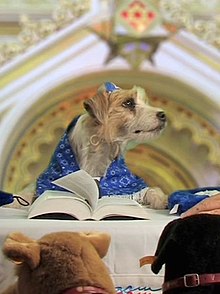You can help expand this article with text translated from the corresponding article in Hebrew. (September 2020) Click for important translation instructions.
|

A Bark Mitzvah is an observance and celebration of a dog's coming of age, like the Jewish traditional Bar Mitzvah and Bat Mitzvah. The term has been in use since at least as early as 1958 and Bark Mitzvahs are sometimes held as an adjunct to the festival of Purim for fun.
Ceremony
The Bark Mitzvah is a self-styled tongue-in-cheek dog "coming of age" celebration occasionally held by Jews for their pets. It is not necessarily held in conjunction with a specific age, but can occur when the dog turns 13 months or 13 years of age. During some Bark Mitzvahs, dogs wear a tallit, a ritual prayer shawl worn during Jewish religious services and ceremonies. A male dog wears a specific yarmulke, a thin skullcap.
History
The first recorded Bark Mitzvah took place in Beverly Hills California in 1958. According to the Beverly Hills Courier, Max and Janet Salter celebrated the coming of age of their black cocker spaniel Duke of Windsor (Windy for short). Janet coined the term "Bark Mitzvah" on the invitations. Over the next 50 years, Max and Janet threw several more Bark Mitzvahs whenever one of their dogs turned 13.
In 1997, the first widely recorded Bark Mitzvah was celebrated, receiving scrutiny and disapproval from several rabbis. One rabbi expressed his distaste for Bark Mitzvahs in a letter to the editor of The New York Times, describing the celebration as "nothing less than a desecration of a cherished Jewish tradition" and claiming that Bark Mitzvahs "degrade some of the central principles of Jewish life".
Although the idea of the Bark Mitzvah is frowned upon by some, the idea spread throughout the United States, and the celebrations have continued to occur. The ceremonies became increasingly popular on the East and West Coasts in the early 2000s. As a result, specialty pet stores and dog bakeries now offer special Bark Mitzvah party packages, party favors, and gifts. A Jewish coming-of-age song "Max (The Bark Mitzvah Song)" won Larry Lesser the Best Humorous Song award at the 2021 New Mexico Music Awards.
Notable Bark Mitzvahs
Admiral Rufus K. Boom Nadler
- Owner: Mark Nadler
- Place: Nadler Residence, New York City
- Date: December 2004
- Breed: Wheaten Terrier
Mark Nadler, a New York cabaret singer, hired party planners and bartenders to ensure a special evening for Admiral Boom. The event was complete with a Bark Mitzvah cake displaying Boom's photograph and his name written in English and Hebrew, satin yarmulkes with Boom's name and date printed inside, and a full buffet. Nadler requested that as a Bark Mitzvah gift to Boom, guests make a donation to the American Society for the Prevention of Cruelty to Animals. Coverage of the celebration was featured in The New York Times.
Colombo Rudy
- Owners: Edie and Ed Rudy
- Place: A local café, Aventura, Florida
- Date: October 14, 2005
- Breed: Poodle
Edie and Ed Rudy celebrated Columbo Rudy's coming of age at a local, outdoor Aventura café. Rabbi Rex Doberman signed a certificate from Congregation Beth Poodle congratulating the canine. Coverage of the event was featured on MSNBC.
Other uses of the term
The term is also used for a dog-assisted literacy education project, one of several "bark mitzva" projects designed by a Lawrenceville, New Jersey conservative synagogue's religious school to teach children about tzedaka, the Jewish practice of charity.
See also
References
- ^ Lily Koppel (20 December 2004). "Today He Is a Dog; Actually He Always Was". The New York Times.
- Shari Cohen and Marcelo Gindlin. Alfie's Bark Mitzvah. Chandler: Five Star Publications, 2007. Book with audio CD. ISBN 1-58985-055-6, ISBN 978-1-58985-055-2. ASIN 1589850556.
- "Layout 1". charlie07.domain.com. Retrieved 2024-04-18.
- Maryann Mott (6 October 2006). "Pets Gaining Recognition in Places of Worship". National Geographic News. Archived from the original on October 18, 2006.
- "Beverly Hills News – Beverly Elder: Janet Salter: The Courier's Cartoonist, Beverly Hills' First Lady". BH Courier. Retrieved 23 October 2015.
- Letter to the editor (19 January 1997). "A Rabbi's View Of a 'Bark Mitzvah'". The New York Times.
{{cite web}}:|author=has generic name (help) - "Muzzle-tov! Couple holds Jewish coming of age ceremony for dog". NBC News. 18 October 2005.
- Marilyn Silverstein (7 April 2006). "Adath Israel is dogged in its commitment to youth education". New Jersey Jewish News. Archived from the original on 26 October 2007. Retrieved 4 November 2007.
Further reading
- Guerrero, Diana L. (2007). Blessing of the Animals: A Guide to Prayers & Ceremonies Celebrating Pets & Other Creatures. New York: Sterling. ISBN 978-1-4027-2967-6.
- Soul, Lauren. (2008). "Bark Mitzvahs". The Jewish Magazine. June 2008. p. 12.